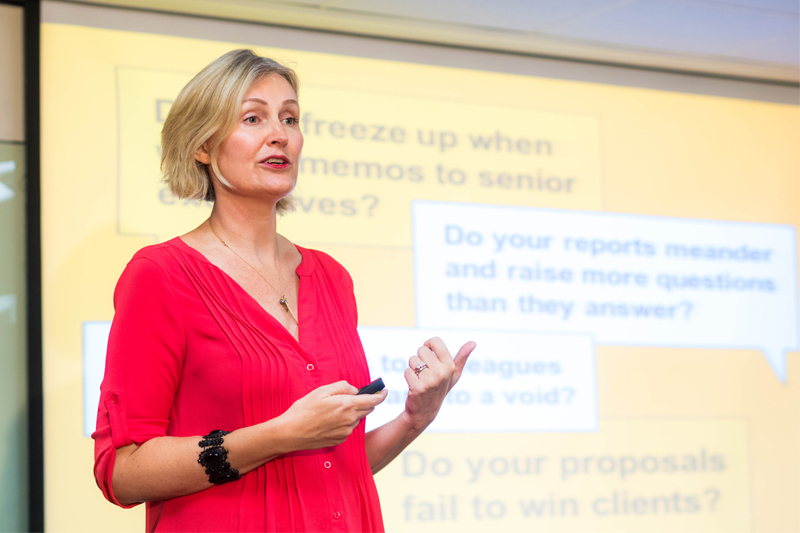Freya Giles set up The Giles Agency as a cure for poorly written communication in business. She argues the case for us all re-educating ourselves in this vital, often overlooked, skill.
Communication isn’t something many of us are properly taught in mainstream education. Despite topping lists of the most desirable employee skills, basic communication skills – ie. getting our message across effectively – can still feel frustratingly elusive, especially in writing. Founded in 2007, The Giles Agency works with various companies such as Swire, Hang Seng and Cathay Pacific to solve this issue. More recently, they’ve also been offering B2C training services such as seminars and online courses to help a wider audience – especially in Hong Kong – communicate better in writing. In a cosy room at the Hive Kennedy Town, founder Freya Giles sat down with Hive Life, condensing years worth of experience into valuable tips she feels are much needed in her hometown. “I wouldn’t say the issue is specific to the Asia Pacific region. It’s definitely universal, but it’s aggravated here by the very academic English that’s taught in schools.”

“Effective communication is communication that gets results,” states Freya. “At work, it’s fairly unusual that we’re writing just to say hi. There’s always some ultimate aim behind it. Sometimes that’s very direct – you’re looking for a sale, but sometimes it’s a bit less tangible and you’re looking to persuade someone to buy into an idea or to motivate your staff.” And doing so effectively is far more consequential than anything on an individual scale. “In any company that’s running successfully, you can pretty much guarantee it has good communications,” says Freya. “It’s absolutely foundational. Without it, teams break down, good staff don’t feel loyal, operations stall and, of course, from a marketing point of view, clients aren’t won over.”
Written communication is rapidly rising up the ranks of desired soft skills – a term that Freya objects to. “Calling a skill ‘soft’ makes it sound less important than other skills,” she says. “I’d rather call it an essential skill.” It’s also a skill that has a broad reach, complementing each and every one of your surrounding talents and proving useful in every aspect of your life. “We used to pick up the phone or have a face-to-face meeting, but now, of course, it’s all project management platforms, WhatsApp, emails. It’s all in writing now. That’s why employers want strong writers.”

Not only is it vital, but the consequences of not being able to communicate effectively are dire. “Some people think that as long as your ideas are good, it doesn’t really matter how good your writing is,” says Freya. “In fact, if your writing isn’t clear, all those great ideas get lost. People either move on from your email or ignore it altogether,” she continues. “Long-winded expressions, jargon or bizspeak put up a barrier and these things trickle down to the bottom line for a company. You’re critically failing to build those valuable relationships.”
And still, for many of us, the teaching required to avoid this is lacking. “The problem with written communication in the workplace is that we don’t really learn it,” she continues. “At school, we’re taught to write in a way that’s quite academic, long-winded and formal. When we leave, that really sticks and we’re never really taught to write for modern communications and in the business setting,” Freya explains. This is where The Giles Agency comes in with their new online course covering everything related to effective business writing. “It’s aimed at anyone professional who is ambitious and wants to do well, but is aware that their writing is letting them down.” In an online forum that encourages engagement and with short lessons and tasks, the onus is on imparting a skill relevant for every corner of your life. “We want it to be a skill they use for the rest of their lives,” says Freya. “It’s not an innate skill. It’s a skill like any other. It’s something you have to learn.” Here are her 3 tips on the lessons you can’t do without.
#1
Be natural
“It is okay to write more or less how you speak. It’s the simplest thing, but it takes so much drilling in. There’s this idea that long words make us sound more intelligent and more professional when actually, that’s just not true, and in any case, that shouldn’t be the primary aim of communication.”
#2
Let your personality shine
“If you’re a really bubbly person, the kind who would sign off your emails with a kiss, then do it! Professional doesn’t have to mean bland! What we’re trying to hammer home to our students is to really personalise their communication and move away from this overly formal business tone which just doesn’t work.”
#3
Put yourself in their shoes
“When it comes to the content of your messages, you need to understand who you’re communicating with, what they need to know, and what they don’t need to know. Know what motivates them and what their challenges and desires are. Build your messages around that.”





